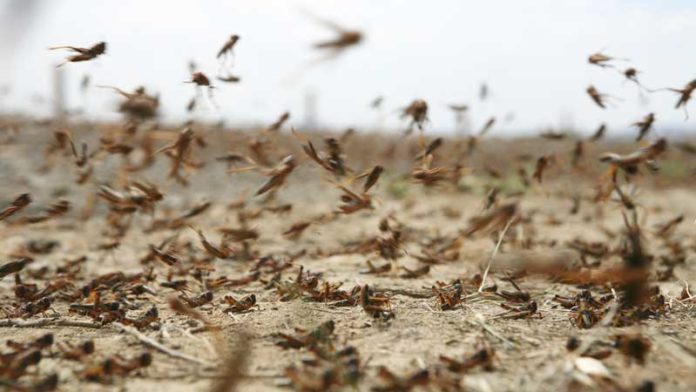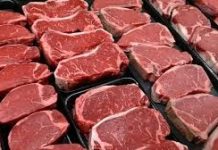By Muhammad Luqman
Pakistani scientists have claimed the successful use of locusts in the production of chicken and animal feed as the insects presently invading the South Asian country are the best source of protein, much needed for raising poultry.
” We are tried to convert the threat into opportunity,” says Dr. Muhammad Khurshid , the official of Pakistan’s Ministry of Food Security who recently concluded a pilot project for collecting locusts in central Pakistan province of Punjab with the help of farming community.
Muhammad Khurshid alongwith bio technologist Johar Ali set up a locusts procurement camp in Pipli Pahar area of Okara district to make purchases at a rate of Rs 20 ( approximately 12 cents) per kilogram of locusts.
“We first taught the the locals how to catch the locusts. Nets are useless against them,” Dr. Muhammad Khurshid explained.
At night, locusts cluster on trees and plants, making them easy to scoop up as they lie motionless in the cooler temperatures until the sun begins to rise.
Organizers struggled at first to convince farmers to join the hunt but, by the third night, word had spread, and hundreds joined in – turning up with their own bags to stuff full.
With 20 tonnes of captured locusts, authorities ran out of money to pay the collectors and the program was stopped.
The ministry, which recently announced the results of February’s pilot, is now preparing to expand the project to other locations.
The harvested locusts went to Lahore-based Hi-Tech Feeds – Pakistan’s largest animal-feed producer – which substituted 10 percent of the soybean in its chicken food with the insects.
“There was no issue with the feed, the locusts have a good potential for use in poultry feed,” general manager Muhammad Athar said, after trying the modified product on 500 broiler hens.
However, there are some poultry farmers who consider the use of locusts in the production of chicken feed unfeasible due to social taboos and hygienic reasons.
” We can’t feed the chicken with such things . This idea is not more than a gossip,” says Khaliq Arshad , former Chairman of Pakistan Poultry Association.
However, Dr. Muhammad Khurshid, who spearheaded this project believes that inclusion of locust may not be a solution to the devastation inflicted on crops. However, it can provide hard-hit farmers with a fresh revenue stream and relieve pressure on authorities struggling to distribute locust-beating pesticides.
Locust swarms have devastated crops across East Africa, the Arabian Peninsula, and parts of India this year, and experts fear their numbers will explode as monsoon rains arrive this month.
The crisis is so severe that Pakistan’s government has declared a nationwide emergency in January and appealed for help from the international community. According to National Disaster Management Authority (NDMA) , crops in about 60 districts of the country are under attack of the locusts. This is the worst ever invasion of the South Asian country by locusts swarms since 1993.
According to the UN’s Food and Agriculture Organization, Pakistan could suffer about $5bn in losses if 25 percent of its crops are damaged.
Farmers fear that a reduced harvest could also push prices up and risks worsening food insecurity.
” Threat of locusts is even worse than corona as it can cause famine in an agricultural country like Pakistan,” says Khalid Mahmood Khokhar, Chairman Pakistan Kissan Ittehad, a farmers’ organization.















